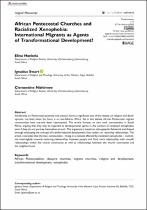| dc.contributor.author | Hankela, Elina | |
| dc.contributor.author | Swart, Ignatius | |
| dc.contributor.author | Nishimwe, Clementine | |
| dc.date.accessioned | 2022-08-26T08:07:08Z | |
| dc.date.available | 2022-08-26T08:07:08Z | |
| dc.date.issued | 2022 | |
| dc.identifier.citation | Hankela, E. et al. (2022). African Pentecostal churches and racialized xenophobia: International migrants as agents of transformational development?. Transformation. 10.1177/02653788221095595 | en_US |
| dc.identifier.issn | 1759-8931 | |
| dc.identifier.uri | 10.1177/02653788221095595 | |
| dc.identifier.uri | http://hdl.handle.net/10566/7772 | |
| dc.description.abstract | Scholarship on Pentecostal potential and practice forms a significant part of the debate on religion and development, not least when the focus is on sub-Saharan Africa. Yet in this debate African Pentecostal migrant
communities have scarcely been represented. The article focuses on two such communities in South
Africa, arguing that they may be regarded as developmental agents in the context of racialized xenophobia,
even if they do not portray themselves as such. The argument is based on ethnographic fieldwork and shaped
through employing the concept of transformational development that centers on restoring relationships. The
article concludes that the two communities – living in a context affected by racialized xenophobia – contribute meaningfully towards restoring relationships between people and God, one’s relationship with oneself,
relationships within the church community as well as relationships between the church community and
the neighborhood. | en_US |
| dc.language.iso | en | en_US |
| dc.publisher | SAGE | en_US |
| dc.subject | African Pentecostalism | en_US |
| dc.subject | Migrant churches | en_US |
| dc.subject | Religion | en_US |
| dc.subject | Xenophobia | en_US |
| dc.subject | South Africa | en_US |
| dc.title | African Pentecostal churches and racialized xenophobia: International migrants as agents of transformational development? | en_US |
| dc.type | Article | en_US |

